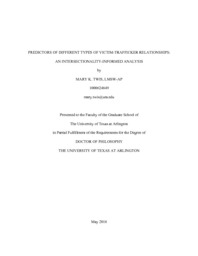| dc.description.abstract | Domestic minor sex trafficking (DMST) is the commercial sexual exploitation of a minor citizen or legal resident within United States borders. The literature about the experiences of DMST victims is an amalgamation of force, exploitation, and sometimes the exercise of personal, if constrained, agency in the decision to exchange sex for money or goods. Unfortunately, federal and local policies do not make much room for the nuances of victim experience, in which multiple oppressive factors may contribute to DMST victimization, or different types of DMST victimization. Instead, officials tend to view DMST as a monolithic crime, rather than a problem that appears driven by victims’ variable experiences with systemic poverty, racism, and family dysfunction. The purpose of this study is to explore how various forms of oppression and risk predict domestic minor sex trafficking (DMST) victimization, particularly within specific subcategories of DMST, such as trafficking by a family member, stranger, friend, or romantic partner.
This study utilizes the secondary case files of 242 domestic minors who were trafficked for sex in one state in Texas between 2012 and 2017. The case files were transferred to the Principal Investigator for coding following data de-identification. After establishing inter-rater reliability, the Principal Investigator coded the case files for the presence of intersectionality-informed variables, such as race, child welfare involvement, juvenile justice involvement, poverty, and more. Keeping with intersectionality theory, the Principal Investigator then employed statistical procedures, such as chi squares, logistic regressions, and path analyses, to explore the multiplicative nature of risk factors in their prediction of different types of victim-trafficker relationships. The results of logistic regression analyses demonstrate that various risk factors interact differently to predict different types of victim-trafficker relationships.
The results of this intersectionality-informed study suggest that DMST victimization is not a monolithic phenomenon, in which all victims share the same experiences of oppression and powerlessness. There appears to be variations between the forms of oppression and risk experienced by victims prior to entering specific victim-trafficker relationship dynamics. Social workers need to articulate these variations to the range of professionals who work within the systems that may prevent, identify, and remediate DMST, such as political systems, criminal justice systems, and victim aftercare systems. This study concludes with specific recommendations for counter-trafficking social workers engaged in education, practice, theory-building, and policy formation. | |


